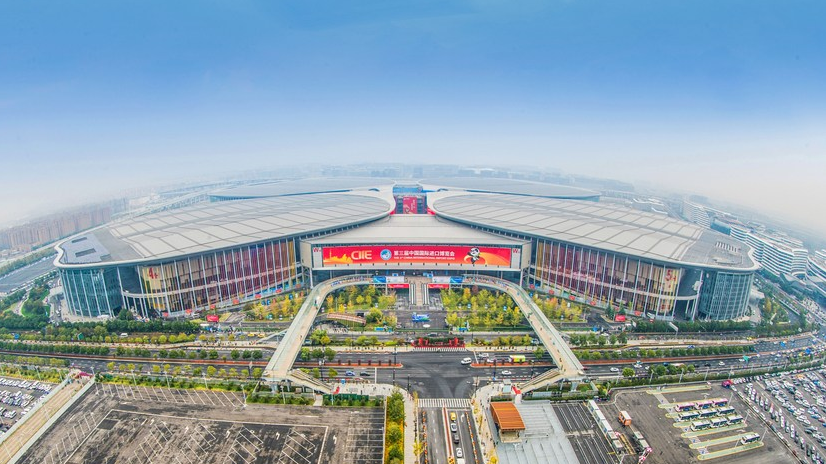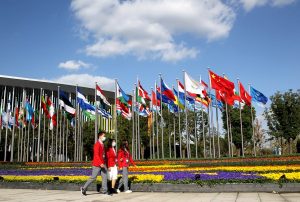Foreign news
What Xi Jinping’s CIIE Speech Means For The World

Editor’s note: Keith Lamb is a University of Oxford graduate with an MSc degree in Contemporary Chinese Studies. His primary research interests are international relations of China and China’s “Socialism with Chinese Characteristics.” The article reflects the author’s opinions, and not necessarily the views of CGTN.
The third China International Import Expo (CIIE) kicked off on November 5 in Shanghai. Despite COVID-19, thousands of companies from across the world, including many on the Fortune 500 list, have turned up to show their products to the ever-burgeoning China market.
As with many international gatherings hosted by China, the scale of CIIE is colossal and a statement of China’s commitment to supporting foreign business. While many economies are still mired in dealing with COVID-19, the CIIE sends a strong signal to the world that China will not shut its doors.

The importance of CIIE and international trade to China cannot be underestimated. This was evidenced by President Xi Jinping’s keynote speech at its opening ceremony.
Speeches given by China’s leaders are carefully thought through and carry a lot of significance for ascertaining China’s future plans. The fact that many of these speeches are later published in hard print, in a number of languages, shows just how important they are for China’s governing system. They are read by members of the Communist Party of China (CPC) so that they can grasp the spirit of China’s plans, coordinate China’s governing strategy and implementation of policy.
With the Chinese market set to grow even bigger over the coming years, it becomes more important than ever that the rest of the world takes note of these speeches. By doing so, the world, especially the West, is able to understand China, and the CPC, beyond the often-distorted picture disseminated by Western mass media. Furthermore, the world is able to grasp China’s future trajectory, make appropriate plans for their own development strategy, vis-à-vis China, and hold China to its word.
The good news for the world, as evidenced in Xi’s speech is, that China will continue to open up its markets to all. Already, the number of pilot free trade zones has increased from 18 to 21 and quality free trade agreements continue to be sought.
The items on the national negative list for foreign investment, which have already been cut from 40 to 33, will continue to decrease. In China, a negative list describes restricted or prohibited activities. China has two of these lists for foreign investment and market access. Any business areas not listed are considered to be open to foreign companies.
China aims to deepen bilateral and multilateral cooperation through concluding free trade agreements with more countries around the world. Free trade zones, like the Hainan free trade port will continue to spearhead China’s opening up. China also aims to encourage greater foreign investment through greater liberalization and spur on technological development through greater protection of intellectual property rights.
Xi said: “China will shorten its catalog of technologies prohibited or restricted from import to create a favorable environment for the free flow of technologies across borders.”
While some have tried to portray China’s dual circulation strategy as China turning its back to the world, in fact China seeks to work for greater globalization albeit one that works democratically for all.
When noting how COVID-19 is a global problem, Xi underscored in his speech the common destiny of mankind, saying, “Bearing in mind the common interests that bind us all, countries need to work together to make economic globalization more open, inclusive and balanced for the benefits of all.”
Xi is determined that domestic circulation will not be a closed loop. On the contrary, the very development of China’s 1.4 billion people will offer a promising market to the world. He noted that the total import into China is estimated to surpass $22 trillion in the next decade.
For those who fear that China will follow a similar economic hegemonic path to the U.S. and other large powers that came before it, Xi’s sentiment reflects the broader feelings of the Chinese people. Using a historical lens to examine the world, they see that powers that sought global hegemony always failed in the long run.
On cooperation, Xi said: “It is ill-advised to pursue unilateral dominance, or choose to hurt others’ interests, which diminishes one’s own interests… It is by working together that we will advance common development of our world.”
For the purpose of common development, China aims to remain a faithful partner of the global multilateral trading system, of the World Trade Organization, characterized by “extensive consultation, joint contribution and shared benefits.”
China has made its position on trade clear. It desires a multilateral trading order where its consumers enjoy greater access to foreign goods. This will lead to more non-Chinese companies profiting from the Chinese market.
While certain sectors of the Western elites try to restart a cold war against China, a “socialist nemesis,” we must keep in mind that some have grown out of the paradigm where trade, capital and markets are a fundamental contradiction to socialism. Judging by China’s upcoming 14th Five-Year Plan, markets, capital and trade are actually essential for China’s journey towards “fully building a modern socialist country.”
Foreign news
Pakistan Moves to Deepen Diplomatic, Economic Relations With Nigeria

The Government of the Islamic Republic of Pakistan has called for deeper diplomatic and economic ties with the Nigerian government to foster development for both countries.
Mr Rana Ihsaan, the Coordinator to the Prime Minister of Pakistan made the call in an interview with the News Agency of Nigeria (NAN) during his working vist to Nigeria on Wednesday in Abuja.
NAN reports that the visiting Coordinator held a closed-door meeting with Yusuf Tuggar, the Minister of Foreign Affairs.
After the meeting, he said that both both sides had agreed on deepening relations in the areas of trade and commerce, among others.
Ihsaan said that both countries must see the need to accelerate efforts towards a Bilateral Trade Agreement (BTA).
He said that Pakistan had already submitted a draft BTA and was awaiting Nigeria’s response.
According to him, discussions centered on easing visa processes, expanding educational exchanges, and strengthening Cooperation in sectors such as Minerals, Youth training, and Defence were highlighted.
Ihsaan said that Pakistan had already implemented visa-on-arrival for Nigerians at no cost, and urged Nigeria to reciprocate to enhance people-to-people ties.
He stressed the importance of high-level engagements between both nations, describing Nigeria and Pakistan as very similar countries with large populations, youthful demographics, and vast economic potentials.
“Deeper collaboration will unlock opportunities in trade, education and investment, while further solidifying long-standing diplomatic relations,” he said.
He said that aside from visiting the foriegn Minister and other top government officials in Nigeria, he was also in the country to attend the on-going West Africa Beauty Exhibition holding in Lagos.
He described the exhibition as one of the continent’s largest cosmetic fairs, adding that he led a delegation of 19 Pakistani business people exploring Nigeria’s estimated 10 million dollar beauty and cosmetics market.
Ihsaan said that Nigeria was a gateway to Africa, adding that Pakistani products, like cosmetics, Textiles, Pharmaceuticals, Food items and Sports goods were already gaining traction in the country.
He encouraged Pakistani exhibitors to establish offices, Warehouses and logistics partnerships to strengthen their foothold in the Nigerian market.
Ihsaan further addressed concerns from Nigerian businesses on the ease of doing business in Pakistan.
He said that the Trade Development Authority of Pakistan had been supporting Nigerian participants at major exhibitions to achieve the ease of doing business.
“The Special Investment Facilitation Council (SIFC) serves as a one-stop platform for Nigerians interested in investing in Pakistan,” he said
Culled from NAN
-

 Featured7 years ago
Featured7 years agoLampard Names New Chelsea Manager
-

 Featured6 years ago
Featured6 years agoFG To Extends Lockdown In FCT, Lagos Ogun states For 7days
-

 Featured6 years ago
Featured6 years agoChildren Custody: Court Adjourns Mike Ezuruonye, Wife’s Case To April 7
-

 Featured7 years ago
Featured7 years agoNYSC Dismisses Report Of DG’s Plan To Islamize Benue Orientation Camp
-

 Featured4 years ago
Featured4 years agoTransfer Saga: How Mikel Obi Refused to compensate me After I Linked Him Worth $4m Deal In Kuwait SC – Okafor
-
Sports3 years ago
TINUBU LAMBAST DELE MOMODU
-

 News1 year ago
News1 year agoZulu to Super Eagles B team, President Tinubu is happy with you
-
Featured6 years ago
Board urges FG to establish one-stop rehabilitation centres in 6 geopolitical zones
